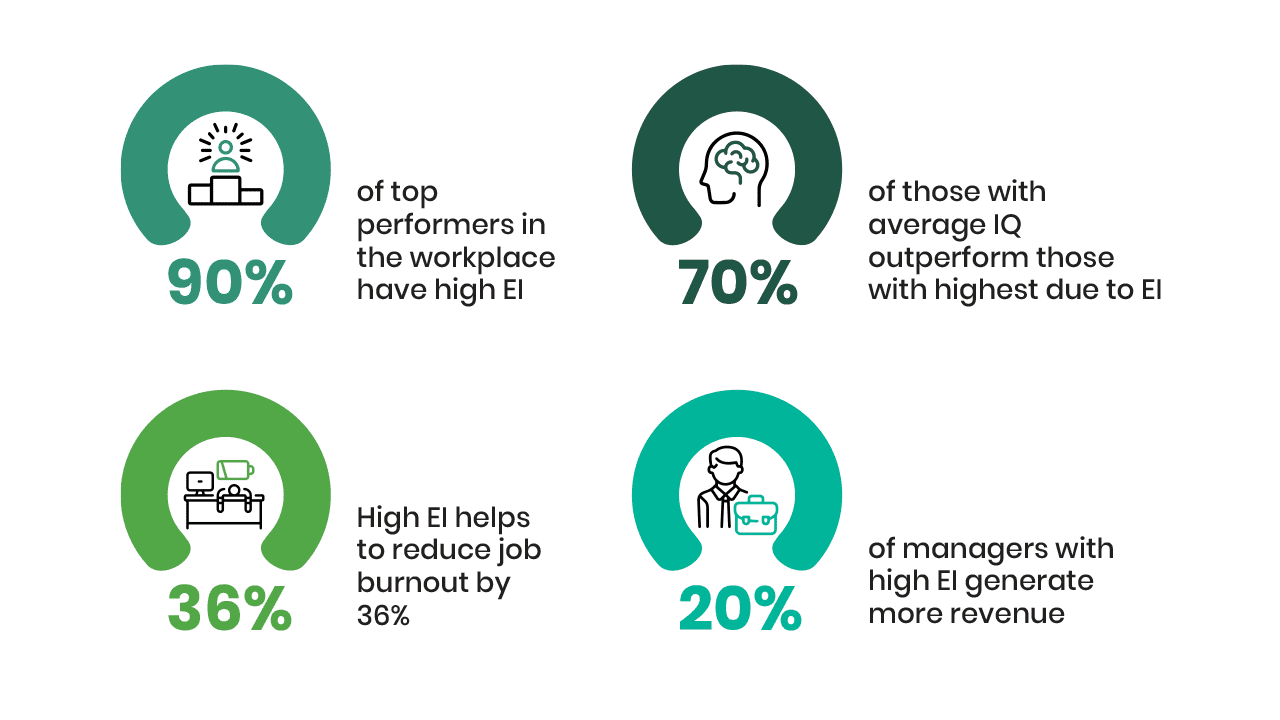In the quest for success and growth in today’s competitive business world, organisations often face frequent conflicts and negative emotional outbursts during strategy meetings. To foster better collaboration and productivity, organisations need to develop unique skills that create an enabling environment. One such skill is Emotional Intelligence (EI), which can help manage emotions, build stronger relationships, and facilitate effective communication.
Emotional Intelligence (EI) is considered to be one of the top future skills that will be required in the workplace. It involves the ability to recognise, understand and manage one’s emotions and those of others. A positive impact of EI in the workplace is evident in several areas, such as better performance, improved workplace relationships, better work-life balance and increased revenue generation.
However, research conducted by EI experts indicates that only 36% of people can understand and manage their own emotions and those of others. Therefore, the organisation must pay attention to developing their employees on various competencies related to Emotional Intelligence. EI positively impacts individuals, teams, and organisations, which can lead to significant success.
EI can be built around these three areas: self-awareness, self-management, and social awareness.
1. Self-awareness is the ability to recognise how your emotions impact your behaviour and how you interact with others.
Tips for Developing Self-Awareness
- Know who and what triggers your emotions. Also, identify patterns of why and how you react to situations.
- Observe your physical and mental reactions, which will help you take a step back to play what happened mentally. This would help you better manage future reactions and continue building your EI.
- Continually seeking feedback from objective critics who have your best interests in mind will also improve self-awareness.
2. Self-Management is the quality that allows you to take charge of your emotions and create a healthy emotional balance.
Tips for Developing Self-Management
- Understand the difference between feelings and emotions and separate them in our reactions. Making an emotion-versus-reason list may help identify what factors, triggers, or indicators prompt your physical reactions or emotions.
- Have a positive attitude and approach towards varying circumstances. It helps build self-control and ensures you’re better positioned to interpret negative emotional outbursts and reinforce emotional control.
- Pause and take a few moments before reacting to an emotional trigger that is experienced. Carry out breathing exercises as you process what’s been said or done.
- Get feedback from a trusted colleague to get others’ viewpoints on your initial emotional reaction and how it impacts those around you.
3. Social Awareness is the ability to recognise and acknowledge other people’s emotions and use that information to help make better business decisions and build relationships.
Tips for Developing Social Awareness
- Watch the body language of those around you as people say much more with their bodies than they ever do out loud. Therefore, strong eye contact, a welcoming tone, and an open and welcoming body position may be used as positive nonverbal signals.
- Listen actively by re-phrasing what team members say to them, confirming their understanding and affirming an undivided attention. It further indicates that you truly care about understanding and learning from them.
- Be empathetic by accepting people for who they are without judging them negatively for being emotionally different. This indicates mutual respect and encourages your colleagues to do the same.
- Acknowledge colleagues’ feelings on issues and give credence to those feelings even if you don’t share the same perspective. This shows that you value mutual respect and encourage your colleagues to do the same.
When individuals can notice, identify, understand, and manage both personal feelings and emotions and those of other people, organisations can work more collaboratively to help employees progress in their career path and improve performance, productivity, and the organisation’s strategic goals.
At pcl., we have learning interventions that help individuals and organisations upskill their Emotional Intelligence competencies, thereby assisting organisations to better position themselves in the current and future competitive market for talent.
Contact us via digitallearning@phillipsconsulting.net , and let’s help you optimise your workforce for improved business growth and increased revenue.
Written by:

Christian Edohor
Head of Delivery, Digital Learning

